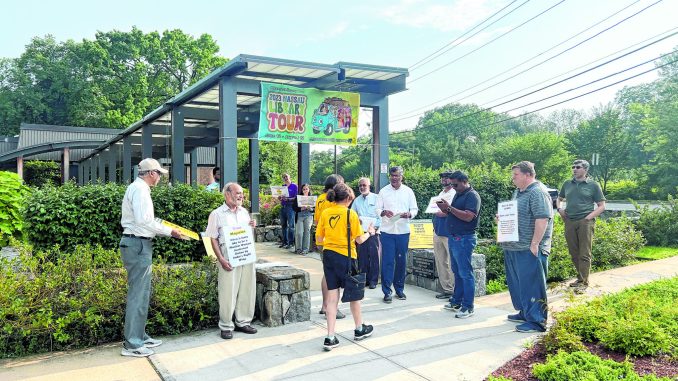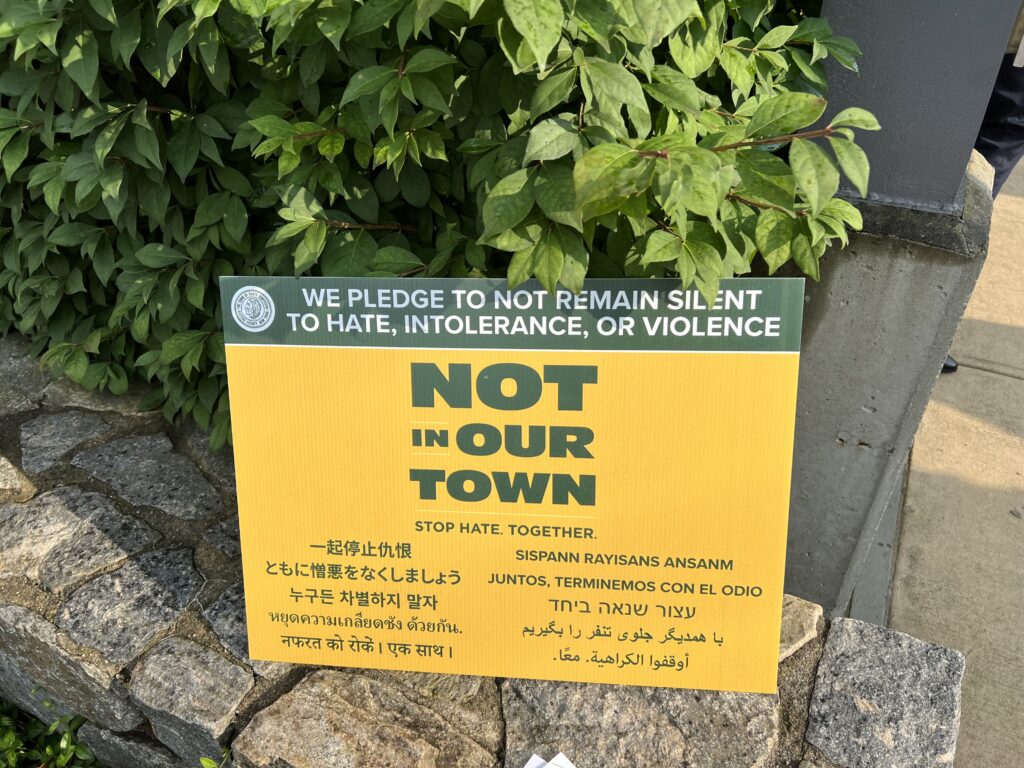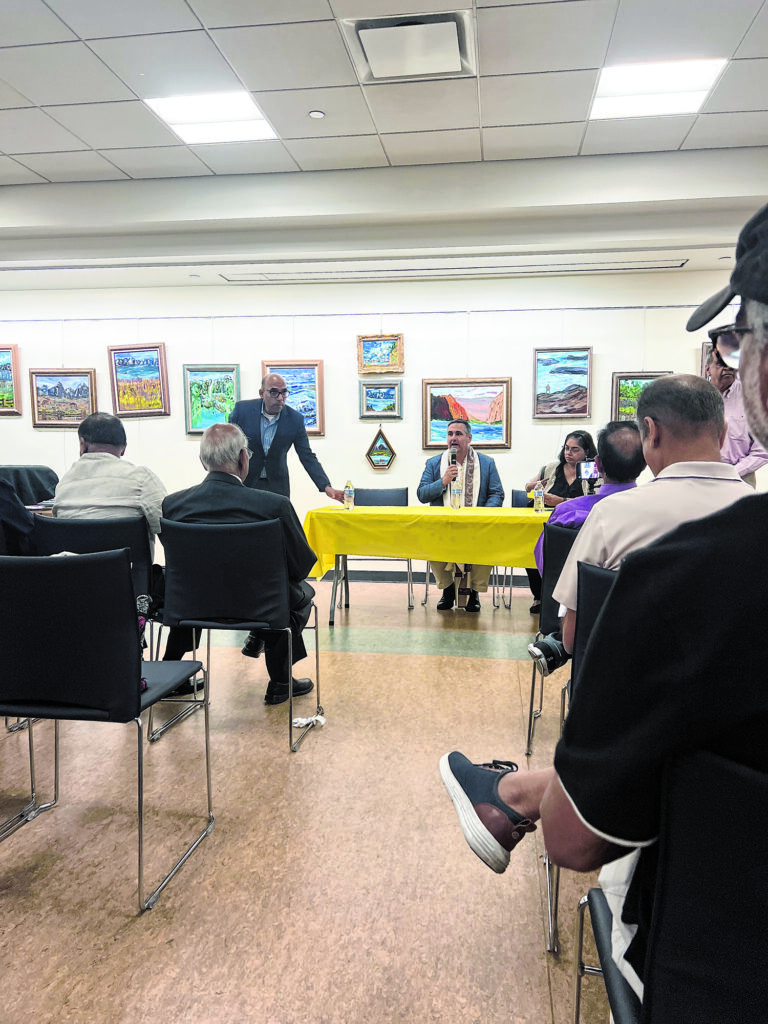
On the heels of Indian Prime Minister Narendra Modi’s state visit to the U.S., a discussion of India’s democracy made its way to the Shelter Rock Public Library in Albertson.
On the evening of Tuesday, July 18, Salvatore Babones, an Associate Professor at the University of Sydney, delivered a lecture at Shelter Rock Public Library entitled “Relationship with India should be driven by DATA not DRAMA.” The event, held in the Community Room, was followed by a question and answer session.
Babones’ invitation to speak by event organizers was of concern to numerous area residents, especially in the wake of the online publication of his recent paper, “Two Nations and a Common Problem Called Islam.” The piece was released on the website Quadrant, a journal known for its right-wing slant and sometimes trending toward extremism. Some residents described Babones’ work as “hateful” and “propaganda.”
“[Babones] doesn’t say ‘Two Nations and the Common Problem Called Muslims.’ He said Islam… [and] there are 2 billion followers of Islam right now in the world,” said Habeeb Ahmed, a member of the library who was born in India, and a nearly 35-year resident of Albertson, in a press conference on Sunday, July 16. “And he’s talking about all those 2 billion people, so this should be concerning to everybody, especially for minorities, but as human beings, we all should be concerned about these kinds of things. Indian Christians and Muslims are being humiliated, intimidated [and] terrorized as if they are not Indian citizens.”
The press conference, organized by Ahmed, was attended by a multi-ethnic, racial, religious and generational coalition, which included several Nassau County legislators and minority community leaders. It was held outside the library, where many attendees questioned why the tax-funded public library was being used for such an event.
“We are not the arbiters of right and wrong here, and we support free speech, but tell me how [are your tax dollars] being served by allowing somebody who spews hate to come into our community?” said Josh Lafazan, the representative for District 18 in the Nassau County Legislature. “There is nothing more fundamental to a community than a library. A library is a place where no matter where you come from, what religion you practice, who you love, your education level, your age, you can come here to learn, and to be together, and to be in peace.”
Arnold Drucker, the representative for District 16 in the Nassau County Legislature, added to this sentiment. “The moment we allow our taxpayer dollars to support and give voice and give a platform to purveyors of this hatred and this discrimination, we are in deep trouble,” said Drucker.
Districts 16 and 18 share many of the residents affiliated with the Shelter Rock Public Library.
The phrase “Not In Our Town” emerged as a rallying cry for those united against the event. Peter Zuckerman, the Town of North Hempstead Councilman for the 2nd District, led a chant of this line during the press conference. The Not In Our Town program was founded by then-North Hempstead Supervisor Judi Bosworth in 2017 in response to a rise in hate crimes on Long Island. The program aims to “stop hate, racism and bullying, and build safe, inclusive communities for all,” according to its website.

“And so whether you’re Asian, whether you’re Jewish, whether you’re Muslim, whether you’re African American, we all unite together because we love this community. And as [Zuckerman] eloquently spoke, ‘Not In Our Town’ — never, right?” said Christine Liu, a board member of the Chinese American Association of North Hempstead.
Despite the concerns of the group and talks with the library’s Board of Trustees, the event continued as scheduled.
“The Shelter Rock Public Library, as all public libraries, is committed to supporting freedom of speech and freedom of expression. The Library has been assured that the subject program is a non-partisan event. The Library will continue to support the first amendment,” wrote President of the Board of Trustees Louise Sobin in a statement.
Two days after the press conference, much of the group stood outside the library’s entrance prior to the event with signs, featuring the “Not In Our Town” slogan and headlines from reports of Islamophobic acts in India. They also distributed sheets with information on the mistreatment of Muslims in India and the potential bias Babones holds toward Modi’s government. A truck with rotating digital images, parked outside the library, further illustrated these sentiments.
Nassau County Police Department officers were present both in the parking lot and just outside of the Community Room.
Babones’ lecture focused on the democracy rankings for India. Taking his audience through the methodology for the Varieties of Democracy Institute (V-Dem) index, he argued that the model, although the best available in his opinion, is fundamentally flawed; as a result, in his opinion, India is ranked lower than it should be.
Of the ranking’s five sub-indices, two are more objective — Elected Officials and Universal Suffrage — and three are more subjective — Clean Elections, Freedom of Association and Freedom of Expression. Babones feels that India is not given enough credit for the functioning of its government, which he claimed in his lecture is “the world’s most extraordinarily successful democracy” to mixed reactions.

“So, let’s say the experts are right. Let’s say it is true that freedoms of expression in India are on par with some of the worst regimes in the world. Even if that were true, a good democracy index would show India having genuine elections, where people can express their views at the ballot box, balanced by a perceived lack of freedom of expression, which would give a middling democracy score,” said Babones.
The ensuing question and answer session was more testy, demonstrating the delicate nature of Indian politics and religious relations. Strictly written questions were permitted. Interruptions from the audience were prevalent, especially when Babones spoke on the treatment of Muslims in India with a heavy emphasis on statistics. At times, questions were skipped in an effort to keep the event non-partisan.
“Overall, I thought he was mindful that we were there,” said Ahmed after the event. “But they call it democracy… [in India] I think it’s a flawed democracy.”

Be the first to comment